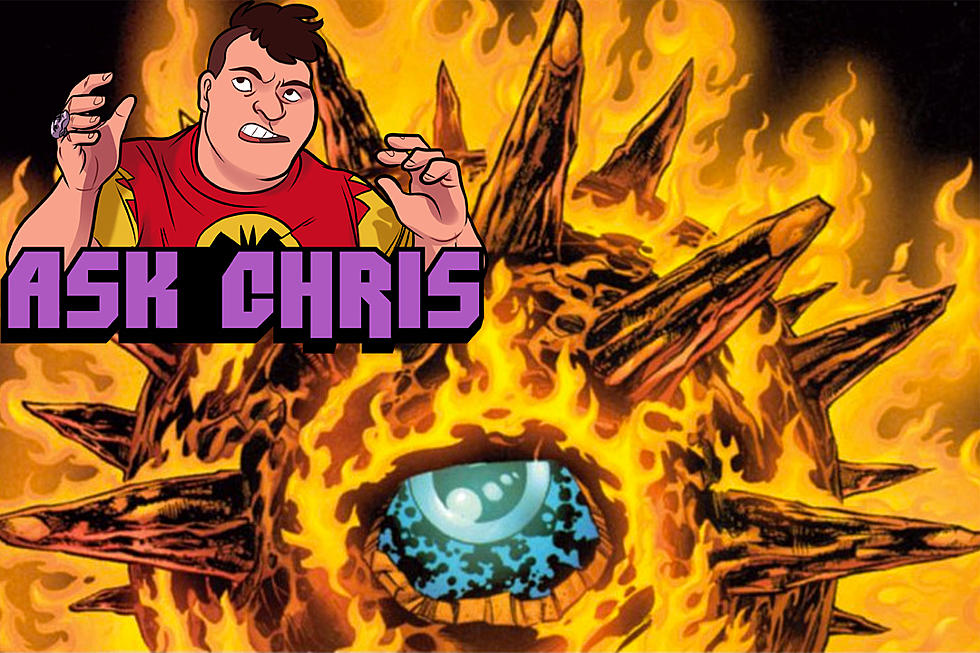![Cameron Stewart On ‘Assassins Creed,’ Moustaches, and Winning the Eisner [Interview]](http://townsquare.media/site/622/files/2010/07/csoberlov.jpg?w=980&q=75)
Cameron Stewart On ‘Assassins Creed,’ Moustaches, and Winning the Eisner [Interview]
If you're not already way into artist Cameron Stewart's work, then we recommend another trip to your local comic shop, since it's pretty hard to miss. Between his Eisner Award-winning webcomic "Sin Titulo," his artwork on "Batman & Robin" with Grant Morrison, and his upcoming three-issue "Assassin's Creed" comic with co-creator Karl Kerschl. Due out this fall, the miniseries ties in in to the Ubisoft sci-fi/historical fiction video game series about a machine called the Animus that allows a man named Desmond Miles to explores the memories of his ancestors -- who happen to be assassins.
In the "Assassin's Creed" comic, Stewart and Kerschl will explore the life of an all-new assassin, a character named Nikolai Orelov whose story begins in turn-of-the-century Russia, and continues during the different stages of his career: apprentice, master assassin, and an older, seasoned veteran.

ComicsAlliance had a chance to clock some time with Stewart towards the end of this year's San Diego Comic-Con, where he took home an Eisner Award, as discussed his collaborative approach to Ubisoft's upcoming "Assassins Creed" comic, working with Grant Morrison on next year's "Thunderworlds" project, mustaches and more.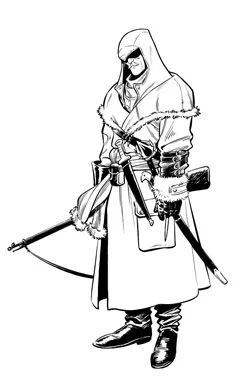 CA: Can you give a little bit of context for the Assassin's Creed project?
CA: Can you give a little bit of context for the Assassin's Creed project?
Stewart: The interesting thing about this particular project is that Ubisoft is treating it very much as an important part of their overall "Assassin's Creed" project... They're not just treating it as a quick knock-off thing that's kind of shoveled out to just advertise the game and the comic is of no consequence. This is something that they're very clear about. I mean, they want to make it a great product that has equal importance with the games. The character that we've created and the storyline that we've created feels like it will be a fundamental building block of this universe that they've created and not just this careless spin-off.
And if we do it right and it's successful, we will hopefully open the door for more projects of that nature, where instead of just tossing it off they hire people who are passionate about the project and step back and let them do their thing. They've told us many times that they don't know how to make comics -- they know how to make video games -- so they've given us tons of freedom and they've just basically said "This is your thing, you do it, make it great." And because Karl and I are passionate about it and we're fans of the games already, we're motivated and inspired to create something that's actually meaningful and has consequence. Hopefully we'll see less of the kind of cheap cash-in stuff and more things that are thoughtfully put together.
CA: Do you think this book will appeal to people who are not that connected to the mythology of the game -- people who are just comic book readers and not gamers?
Stewart: Ubisoft told us when we went in for our first creative meeting that what they wanted was different entry points to the the property, and they would like the comic to be completely accessible to someone who has never played the games. Hopefully if they read the comic and they enjoy it, then it will possibly intrigue them and they will want to know more, and they might pick up the games and play those. Karl and I are trying to make a story that does not depend on knowledge of the game in order to enjoy it, in order to be satisfied. There's certainly a lot of stuff that will be in it that will have greater significance if you are familiar with the game... But it's the kind of thing where we're trying to make a satisfying comic, we're not trying to make something that will only work if you're familiar with something else, and we're doing that just by trying to create strong characters and a good storyline that would stand on its own, whether it's "Assassin's Creed" or not.
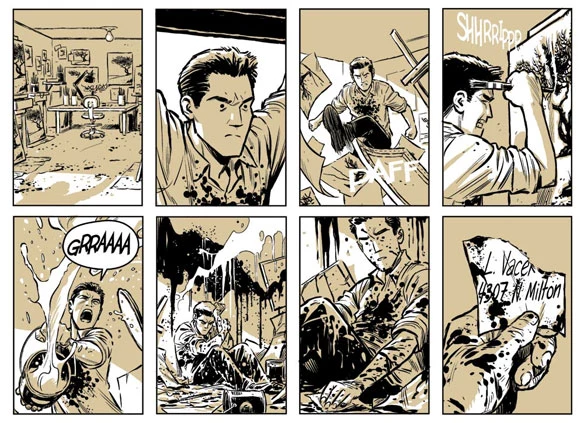
CA: Congratulations on the Eisner Award for Best Digital Comic, by the way.
Stewart: Thank you very much, I appreciate it.
CA: It's been interesting seeing that you've been competing with your artistic partner, I'm sure...
Stewart: [Laughs] But sworn enemies at night. No, I mean, I actually did not expect to win. I thought for sure that if it was not Karl, I thought it would be Bayou. I was hoping, well I have to say I was hoping it would be me, but I would have been extremely happy if Karl had won. You know, we're really good friends and I don't think there was any ego or actual competition between us. Because Karl and I -- in webcomics are part of the same collective [TX Comics] -- I kind of took it was a win for all of us, really. In my speech, I thanked all the other guys at TX, because it's really a feather in all of our caps.
CA: You're thriving as a webcomic creator, you're doing a lot of work for DC, and now you're working on this transmedia property. Do you think you have a unique perspective working on these kind of three major areas of where comics are at?
 Stewart: I feel like I'm somewhat unique in that I do have my fingers in all these pies. Like the work that I do for myself, the webcomic ["Sin Titulo"], is so completely different from "Batman and Robin," and that keeps it really interesting for me. I don't think I would want to do any of these things only. It's really interesting and refreshing for me to bounce around... It's like there are these directors like Steven Soderbergh who go and do a really small indie film and then do "Ocean's Eleven" with all these huge stars. That's how I feel between doing my webcomic and then coming and working on "Batman and Robin." ...They all feed off each other and they all inform each other. They might not superficially look like the same thing, but I think they're all points on the triangle .
Stewart: I feel like I'm somewhat unique in that I do have my fingers in all these pies. Like the work that I do for myself, the webcomic ["Sin Titulo"], is so completely different from "Batman and Robin," and that keeps it really interesting for me. I don't think I would want to do any of these things only. It's really interesting and refreshing for me to bounce around... It's like there are these directors like Steven Soderbergh who go and do a really small indie film and then do "Ocean's Eleven" with all these huge stars. That's how I feel between doing my webcomic and then coming and working on "Batman and Robin." ...They all feed off each other and they all inform each other. They might not superficially look like the same thing, but I think they're all points on the triangle .
CA: Do you think you have different styles that you bring to each area?
Stewart: Yeah, I think so. I think if you look at my work, you'd probably be able to recognize the same kind of fundamentals in there... I try to approach each project that I do with a different style, because it makes it more interesting for me. I don't want to just do the same thing over and over and over again. I feel like different projects require different approaches. It's almost kind of dangerous as an artist to pigeonhole yourself and only do one thing, because then when you're required to do something different, you can't. So the more I can experiment and play and utilize different styles and different approaches, the broader my skill set is, and it will open doors to things that might not have come up otherwise.
CA: Have you and Karl actually drawn together before, in the way that you're doing for "Assassin's Creed"?
Stewart: No, no, never. The only thing that we've done so far is... a short sample that was actually based on "Assassin's Creed 2" featuring Ezio, and we set it in Venice... I've already had people assume that I'll be penciling and Karl will be inking, for example, and we're going to divide it that way. But it's very collaborative; we're literally jamming on the page. I'll do a very rough marker layout and then give it to him, and he'll translate that into a rough blue line on the page. Then I'll go in and do tighter pencils and then he'll take those and refine those and change some details, and then he'll give it back to me and I'll add in some stuff in the background.
It's really interesting and organic. Sometimes when you're working on a comic, it can be daunting because you know that you're the only person doing it. Sometimes I get into problems where I have an off day and I just can't crack this one page, or I can't get this one panel to look the way, and sometimes it just feels like you're in it on your own. In this case, because there's the two of us working together, we can prop each other up and hopefully take each other's strengths and enhance them ,and be something greater than the sum of its parts... It's very much like the writing, I mean, our writing has been very organic. He and I just go and sit in a cafe, and just shoot ideas back and forth... and then write it all down. It's surprisingly fun and easy to do it that way, almost to the point where we think "How do people do it on their own?" Because it's so easy to do it with a partner, I can't imagine going back and writing something like this on my own.
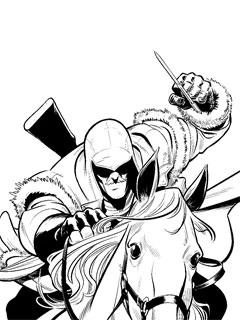 CA: I hope this is a model that could be advanced within the industry, this collaborative model.
CA: I hope this is a model that could be advanced within the industry, this collaborative model.
Stewart: Yeah, I mean, it requires [collaborators] to sacrifice a bit of ego, because the work that's on the page is not strictly mine, and not strictly his, you know? So there's not going to be any sense of like "Well, this is my page that I drew" and kind of showing off. It will be the two of us together on every page. Hopefully it'll be cool.
CA: Ok, this is going to seem a little bit out of left field, but I admire your decision to really stick with your guns on the mustaches [in the "Assassin's Creed "comic]. I'm a big mustache guy, so I wanted to mention that.
Stewart: [Laughs] We had opposition to a couple of things about the costume from Ubisoft at the beginning, but the mustache was never one of them, I mean, it's just, it's accurate to the time. We were doing research and we were looking through pictures of men at that age at that time, every single one had a mustache. And we commented on it, "look at this, every dude has a mustache!" So we naturally have to give the guy a mustache. I don't know, some people think it looks cool, some people think it looks silly...
CA: Hipsters will like it.
Stewart: [Laughs] Yeah! Some people have said that it looks like Solid Snake from "Metal Gear," but whatever. He's got a mustache.
CA: One last question. Grant Morrison was talking about "Multiversity" and the upcoming "Thunderworlds" book that's coming out sometime next year. Can we chat about that?
Stewart: You know literally as much as I do. I mean, it was something that he asked me about three years ago, I think, and said "We're going to do these 'Multiversity' things, and I think you'd be really good for the Captain Marvel one, would you be interested?" and I said, "Sure." But I know nothing about the story. The only thing that I know about that he's told me is that it's intended to - I don't even know if he said this on the panel - but it's going to be an "All Star Superman" approach to Captain Marvel, so somewhat continuity-free and just kind of like an "Alpha" take on the Marvel Family, which sounds really cool. So I'm down for it, for sure. It's got a great title. "Thunderworld" is an awesome title.
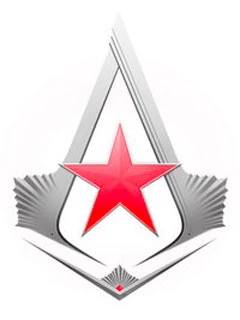 CA: Yeah, it's great to leave the "Shazam" out.
CA: Yeah, it's great to leave the "Shazam" out.
Stewart: Yeah. But aside from that, Grant will get me a script at some point, I'm sure, and then I'll know what it's about. [Laughs] He's someone [where] I will just take it on faith that it will be good, and I don't necessarily have to know. There's been a lot of other projects that I have been offered where I'd say, "Well, let me read the script first before I decide whether or not to do it." I'm very much someone who is interested in story, first and foremost.
A common question I get asked all the time is "Which character would you love to draw?" and the answer is I don't have one. I don't really care enough just about Spider-Man for the sake of Spider-Man. In order to commit to drawing a Spider-Man comic, it would have to be a really, really great story about Spider-Man that I found interesting and compelling, and worth telling. But with Grant, I've worked with him enough and I admire his work enough that I'm fairly certain that it will be a good story, regardless of whether I've read it or not already. I'm willing to just take the dive and agree to do it.
Check out a video trailer for the Assassin's Creed comic:
More From ComicsAlliance




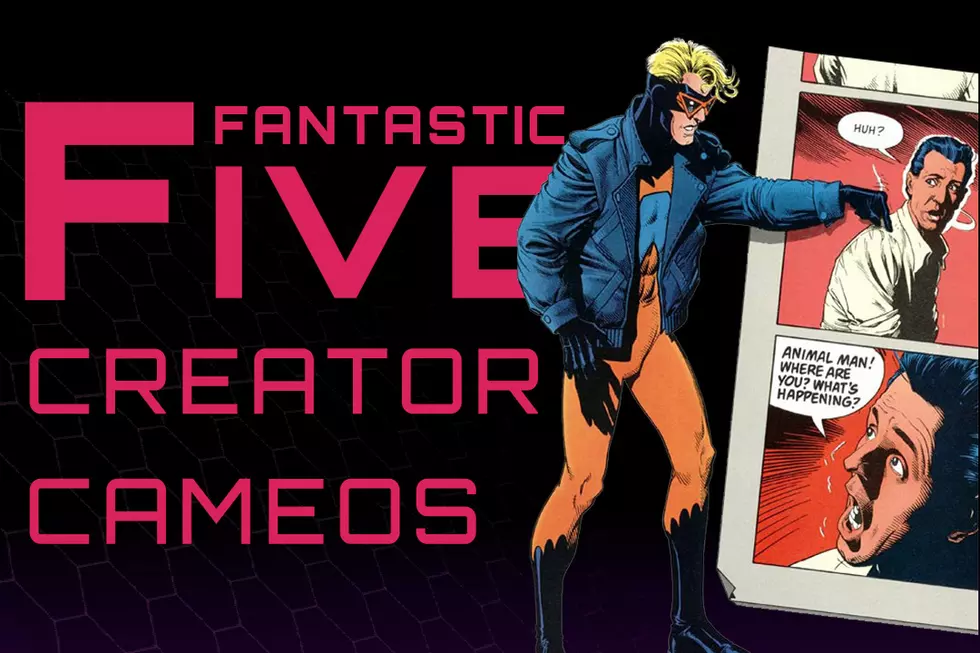

![Batgirl’s Latest DC Collectibles Figure Cements Her Status as a DC Icon [Review]](http://townsquare.media/site/622/files/2017/02/IMG_1606.jpg?w=980&q=75)
![Requiescat In Pace: Ezio Returns In ‘Assassin’s Creed: Reflections’ #1 [Preview]](http://townsquare.media/site/622/files/2017/02/ACFeat.png?w=980&q=75)
